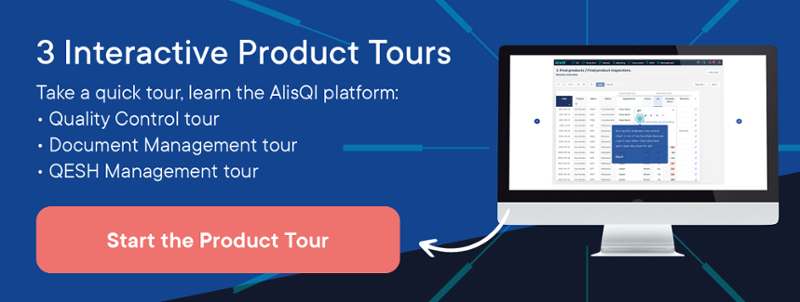Solvers help you monitor quality, apply SPC, manage equipment, and ensure traceability.

The benefits of regulatory compliance for non-regulated industries
These days, all industries, including the more pragmatic ones see increasing pressure in adhering to norms and regulations. And these requirements will only increase over time. For quality leaders, it’s important to understand what compliance is, why it’s there and how they can use it to their benefit.
Recently, AlisQI CEO, Gerben de Haan, delivered a webinar presentation on the relevance and benefits of regulatory compliance for non-regulated industries. In this post, we’ll be summarizing some key takeaways from the webinar, which you can view in full here.
Compliance: what it involves and why it exists
Viewed from a high level, compliance is the set of processes and procedures that support adherence to the laws and regulations established by the jurisdiction in which the organization operates. Folded within that are regulatory compliance, industry standards, and company norms.
Why does compliance exist? Overall, laws and regulations imposed by governmental bodies exist for one main reason: to protect public health. Industry standards aim to help organizations to standardize their operation and make them work efficiently. Therefore, the certification can be seen as an objective maturity check for external supply chain partners. Being certified for ISO 9001, for example, shows that a company has a standardized production process with well-established incident handling processes. This helps potential customers in their assessment of whether a company is safe to buy from.
Compliance – beneficial in any industry
It’s common to delineate between regulated and non-regulated industries. The truth is, however, that all industries are regulated to some degree. It is just the number of regulations and how they are applied that differ. For that reason, we refer to less-regulated industries as pragmatic industries.
A big advantage in pragmatic industries is that you have the freedom to cherry-pick requirements that add the most value to your operation and ignore anything that only adds administrative hassle. To do this and get the most value out of compliance:
Gain a proper understanding. Educate yourself on compliance in your industry and other industries too. Once you define compliance requirements that could function as best practices, you can translate these to your business.
Embed compliance requirements in your operation. Maintain a focus on three aspects during this process— Effort, Clarity, and Accountability:
- Effort — Make compliance as easy as possible to adopt. The easier it is to be compliant; the more likely people are to behave compliantly.
- Clarity— Make sure that your team understands how a process needs to be completed and the relevance of compliance for that process and the business as a whole. People are better motivated to do things that make sense.
- Accountability— Focus, too, on visibility and ownership. People will be more likely to adhere to processes if they are accountable for the outcome of the process.
Validating your process design against these criteria will be instrumental in improving process adherence and adoption of compliance, bringing real and tangible benefits to your operations.
Examples – how to take the good parts of compliance
In the webinar, Gerben goes into great depth to illustrate how manufacturers can leverage the good parts of compliance using AlisQI. He demonstrates how AlisQI delivers off-the-shelf compliance in five different use cases, including:
- Traceability. Helps manufacturers to document the entire supply chain for a product, making it easy to assess the different steps and intervene in case of incidents.
- Calibration. Automating this process ensures adherence and contributes to more reliable quality control data points.
- Audit trails. Adds accountability and an extra level of clarity as to who did what and when.
- CAPA management. Enables manufacturers to identify deviations and implement corrective measures; and,
- Document versioning. Helps manufacturers who struggle with their documentation and version management and ensures that teams are familiar with SOPs relevant to their roles.
Key Takeaways
There is true value in compliance requirements that you might experience as an administrative burden. Take the time to assess the value, implement them in a clever way and you’ll reap the benefits quickly. Leveraging automated solutions such as AlisQI can give you the edge you need to do this as efficiently and easily as possible so that you can glean the most value from your compliance efforts.


